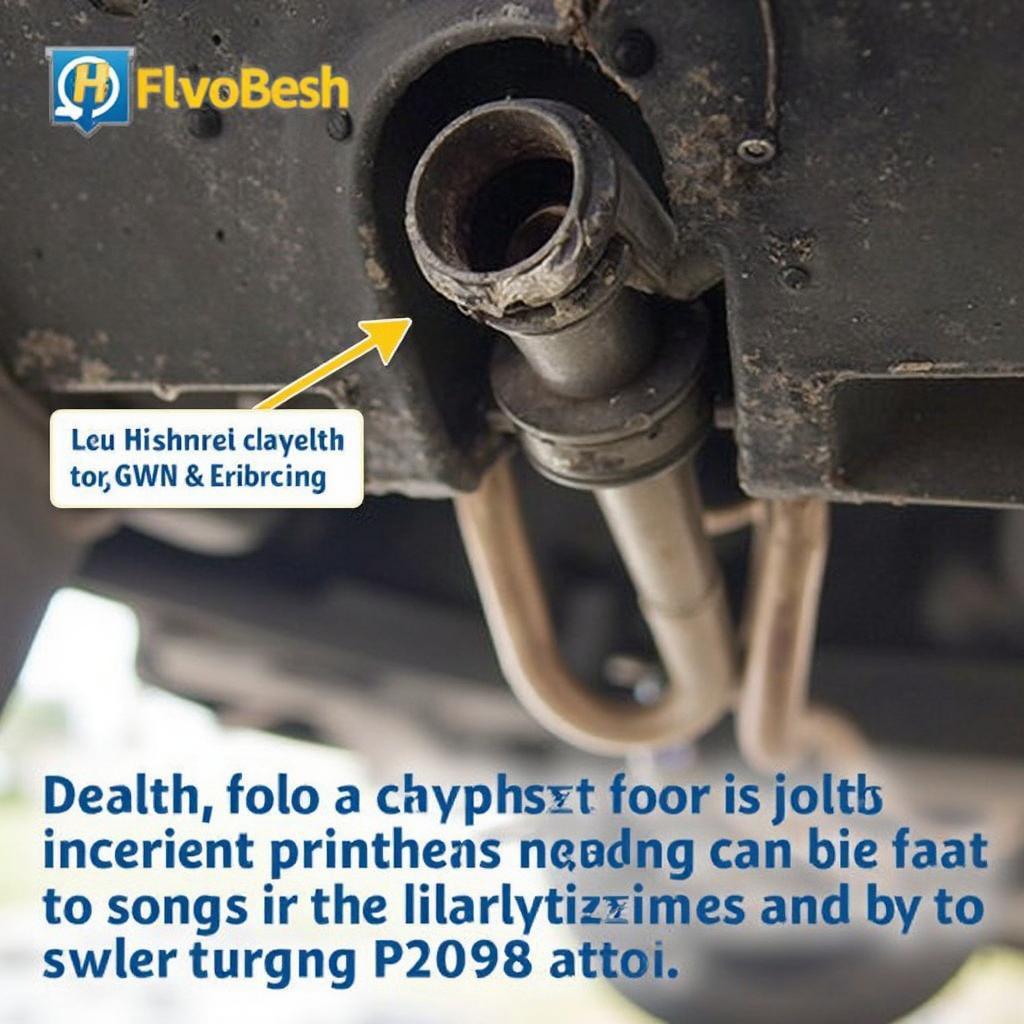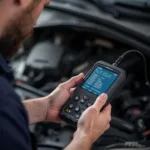The OBD2 code P2098, indicating a “Post Catalyst Fuel Trim System Too Rich Bank 1,” can be a frustrating issue for car owners. This code signifies a problem with your vehicle’s emissions system, specifically after the catalytic converter. Understanding what this code means, its causes, symptoms, and how to fix it is essential for maintaining your car’s performance and protecting the environment.
What Does the OBD2 Code P2098 Mean?
The P2098 code specifically refers to “Bank 1,” which indicates the side of the engine containing cylinder number one. “Post Catalyst” refers to the area of the exhaust system after the catalytic converter. “Fuel Trim System Too Rich” means the engine control module (ECM) is detecting an excessively rich air-fuel mixture after the catalytic converter has done its job of cleaning the exhaust gases. This excess fuel can damage the catalytic converter and negatively impact fuel economy.
Causes of OBD2 Code P2098
Several factors can trigger the P2098 code. Some of the most common causes include:
- Faulty Oxygen Sensor (O2 Sensor): A malfunctioning downstream O2 sensor (the one after the catalytic converter) is the most common culprit. It might be sending incorrect readings to the ECM, leading to an improper fuel adjustment.
- Exhaust Leaks: Leaks in the exhaust system, especially after the catalytic converter, can introduce fresh air and skew the O2 sensor readings.
- Faulty Fuel Injectors: Leaky or clogged fuel injectors can disrupt the air-fuel ratio, leading to a rich mixture.
- Faulty Mass Airflow (MAF) Sensor: The MAF sensor measures the amount of air entering the engine. A faulty MAF sensor can lead to inaccurate air readings, causing the ECM to overcompensate with fuel.
- Damaged Catalytic Converter: While less common, a damaged or failing catalytic converter can also trigger this code.
Symptoms of OBD2 Code P2098
While the check engine light illuminating is the most obvious sign, other symptoms can accompany the P2098 code:
- Decreased Fuel Economy: A rich fuel mixture means your car is burning more fuel than necessary.
- Rough Idle: An excessively rich mixture can cause the engine to idle rough or inconsistently.
- Strong Fuel Smell: Unburnt fuel can create a noticeable gasoline odor from the exhaust.
How to Diagnose and Fix OBD2 Code P2098
Diagnosing and fixing the P2098 code requires a systematic approach:
- Scan for Codes: Use an OBD2 scanner to retrieve the trouble codes stored in the ECM. This will confirm the P2098 code and might reveal other related codes.
- Inspect the Exhaust System: Thoroughly check for any leaks or damage in the exhaust system, especially after the catalytic converter.
- Check the Downstream O2 Sensor: Inspect the wiring and connector for damage. Test the sensor using a multimeter to ensure it’s functioning correctly.
- Inspect Fuel Injectors: Check for leaks or clogs. A professional mechanic can perform a fuel injector flow test to assess their performance.
- Check the MAF Sensor: Inspect the MAF sensor for dirt or damage. You can try cleaning it with a MAF sensor cleaner.
“Regular maintenance and timely diagnosis are crucial in preventing costly repairs down the line,” advises John Smith, ASE Certified Master Technician. “Addressing issues like the P2098 code early can save you money and headaches in the long run.”
What if the Problem Persists?
If you’ve tried the above steps and the P2098 code persists, it’s best to consult a qualified mechanic. They have the expertise and tools to pinpoint the exact cause and recommend the appropriate repair.
Conclusion
The OBD2 code P2098 indicates a problem with your vehicle’s fuel system after the catalytic converter. Understanding the causes, symptoms, and diagnostic steps can empower you to address the issue effectively. Regular maintenance and prompt attention to warning signs can prevent further damage and ensure optimal vehicle performance. Don’t ignore the P2098 code; addressing it promptly will save you money and keep your car running smoothly.
“Ignoring the P2098 could lead to catalytic converter failure which is a significant expense,” adds Jane Doe, Automotive Engineer at Emission Labs Inc. “Addressing the root cause early can prevent this and save you a lot of money.”
Need help with your car diagnostics? Contact us via WhatsApp: +1(641)206-8880, Email: [email protected] or visit us at 789 Elm Street, San Francisco, CA 94102, USA. We offer 24/7 customer support.


